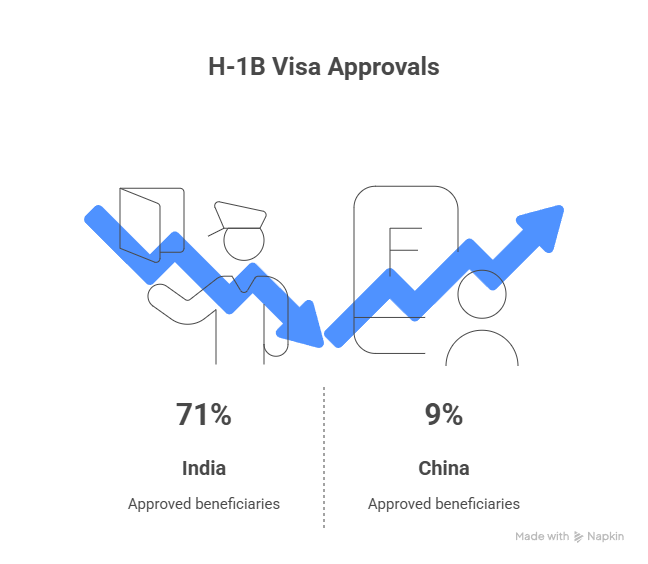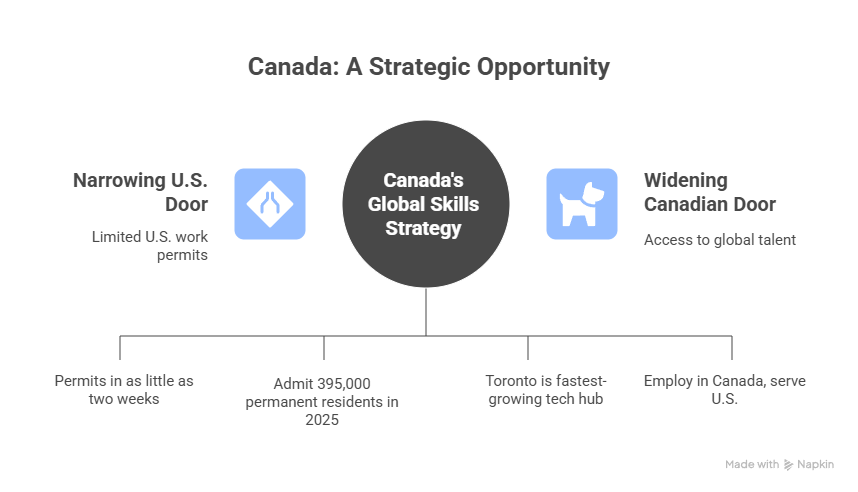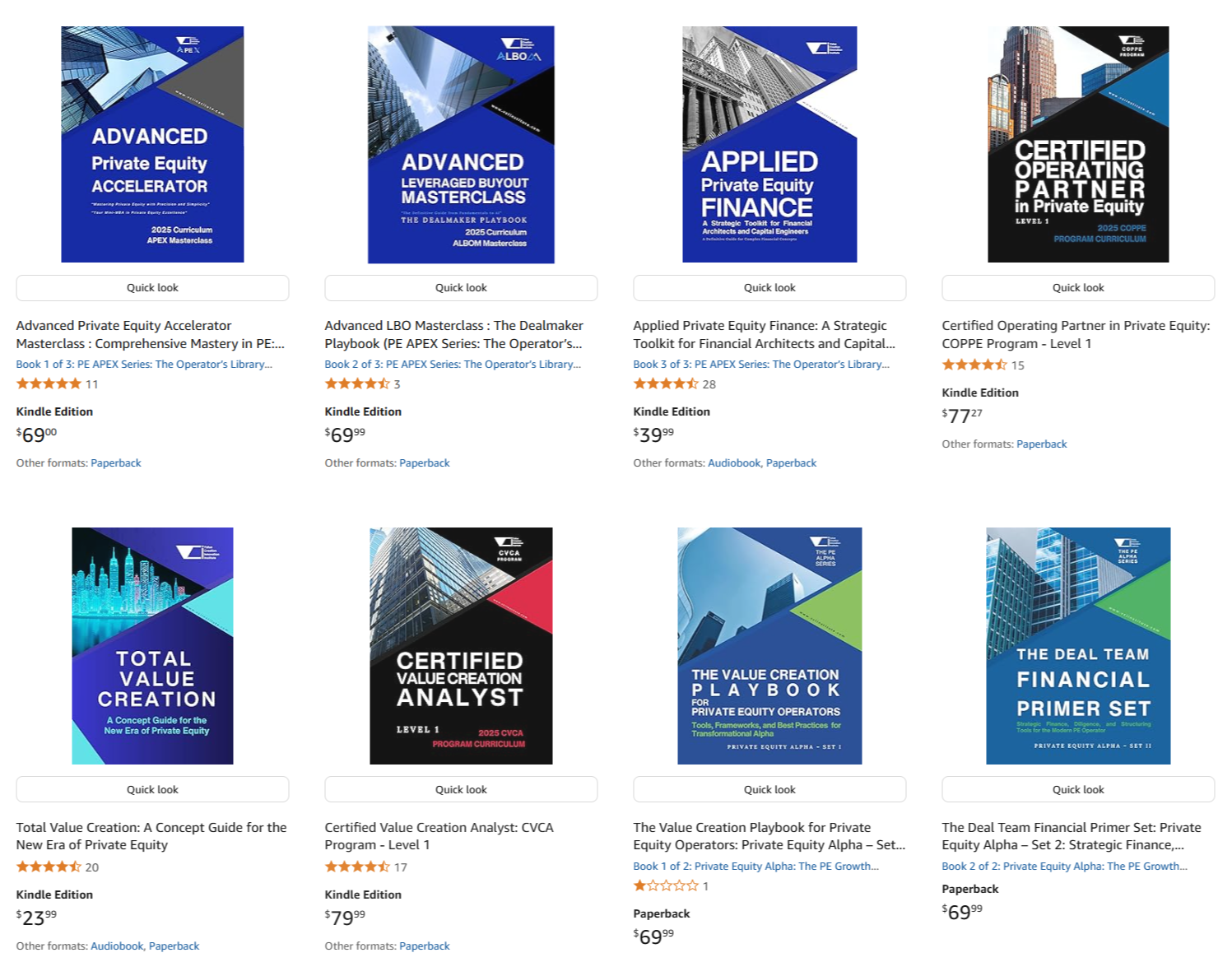The $100,000 Door: How a New Visa Fee is Forcing MBAs and Employers to Rethink the American Dream
Oct 25, 2025
The era of predictable U.S. immigration pathways for global talent is over. On September 19, 2025, a presidential proclamation introduced a seismic shift: a $100,000 supplemental fee on new H-1B petitions, effective from September 21, 2025. While legal challenges from the U.S. Chamber of Commerce and other business groups continue, USCIS issued clarifying guidance on October 20, 2025, confirming the fee applies only to new petitions for beneficiaries outside the U.S. without a valid H-1B visa. This policy has already created strategic uncertainty that will reshape talent markets for years to come.
For MBAs and employers who built careers and business models around accessing U.S. markets, this isn't just a policy change—it's a fundamental reset that demands immediate strategic recalibration.

The New Calculus: Who Pays and Who Doesn't
The $100,000 fee applies specifically to new H-1B petitions for foreign nationals outside the United States who do not have a valid H-1B visa, not to renewals, extensions, or amendments for existing visa holders. This critical distinction means current H-1B holders working in private equity, tech, and consulting can breathe slightly easier, while those seeking initial sponsorship face a dramatically different landscape.
According to USCIS data through fiscal year 2025 (Q3), H-1B approvals are heavily concentrated in tech and finance, with top employers like Meta (5,123 approvals), Apple (4,201), and Google (4,181) relying on the program. India accounts for 71% of approved beneficiaries, followed by China at 9%. With the average total cost of sponsoring an H-1B employee already ranging from $5,000 to $10,000 in legal and filing fees, the new supplemental fee represents a ten to twenty-fold increase in upfront investment.
Employer Calculus: The Sponsorship Equation Changes Overnight
The fee transforms H-1B sponsorship from a routine administrative process to a strategic capital allocation decision. For employers, the math becomes brutally simple: at $100,000 per petition, sponsorship now requires clear, immediate ROI justification.
The industries most affected reveal the stakes. H-1B workers constitute significant portions of the U.S. tech workforce, with approximately 60% of full-time graduate students in computer science at U.S. universities being international students. In finance and consulting, the percentages, while lower, represent crucial talent pipelines for global firms.
Faced with this new reality, employers have three options: absorb the cost for truly exceptional candidates, shift recruitment toward U.S. citizens and permanent residents, or relocate roles to markets with more favorable immigration policies. The smartest firms are already pursuing all three simultaneously.

The Canadian Opportunity: More Than Just a Backup Plan
While the U.S. door narrows, Canada's widens—and policymakers are seizing the moment. Prime Minister Mark Carney's recent announcements align with Canada's broader strategic advantage: its Global Skills Strategy can deliver work permits in as little as two weeks, compared to the U.S. H-1B's months-long uncertainty.
The numbers tell a compelling story. According to the 2025–2027 Immigration Levels Plan announced on October 24, 2024, Canada aims to admit 395,000 permanent residents in 2025, with a focus on skilled workers through programs like Express Entry. Toronto has emerged as North America's fastest-growing tech hub, while Montreal and Calgary are building specialized strengths in AI and energy transition finance—all fields hungry for MBA-level talent.
For private equity specifically, the model of "employ in Canada, serve U.S. portfolios" is becoming increasingly viable. Canadian PE firms can now access global talent priced out of U.S. markets, while U.S. firms are establishing Canadian pods for functions like portfolio operations, pricing analytics, and FP&A that can seamlessly support stateside investments.
The MBA Playbook: Navigating the New Reality
For current MBA students and recent graduates, strategic adaptation is no longer optional. Those on F-1 visas should immediately maximize their OPT and STEM OPT periods—typically 12-36 months of U.S. work authorization that doesn't require employer sponsorship. This window becomes crucial for demonstrating value that might eventually justify sponsorship despite the fee.
The smartest candidates are developing what immigration attorneys call the "North American career path"—building skills and networks that create value across borders. This means considering Canadian business schools as strategic alternatives, targeting firms with established cross-border operations, and developing expertise in functions that travel well across jurisdictions.
For all candidates, demonstrating immediate, measurable impact becomes non-negotiable. In a world where sponsorship represents a six-figure bet, employers will only place wagers on candidates who can deliver rapid, quantifiable returns.
The Bottom Line: Uncertainty as the New Normal
Whether the $100,000 fee survives ongoing legal challenges almost becomes secondary to the new reality it has created: immigration policy is now a variable, not a constant, in career and business planning.
The firms that thrive will be those that build flexible talent strategies capable of adapting to policy shifts. The professionals who succeed will be those who cultivate portable skills and cross-border networks. And the business ecosystems that win will be those, like Canada's, that position themselves as strategic alternatives when doors elsewhere begin to close.
In this new environment, the most valuable asset isn't a visa—it's the strategic agility to navigate whatever border policies come next.
© VCII 2025 By Tracy Wong (www.vciinstitute.com)
We have many great affordable courses waiting for you!
Stay connected with news and updates!
Join our mailing list to receive the latest news and updates from our team.
Don't worry, your information will not be shared.
We hate SPAM. We will never sell your information, for any reason.


